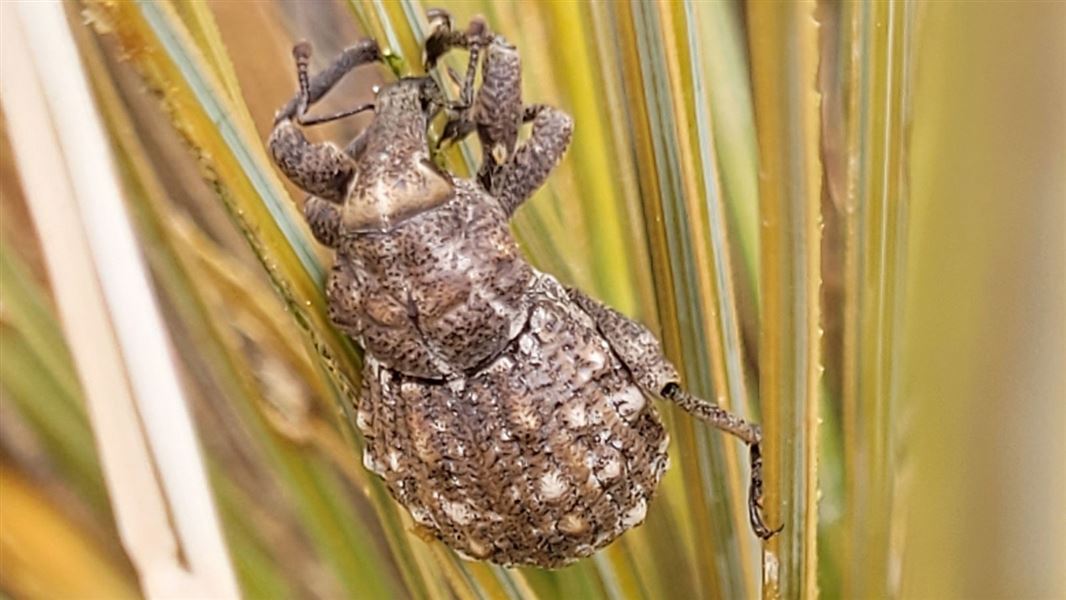Date: 20 December 2024
John Evans found three of the distinctive looking weevils on a speargrass plant in Ōtuwharekai/Ashburton Lakes in November, posting pictures to citizen science network iNaturalist and a New Zealand bug identification Facebook group.
The pictures spurred a flurry of interest from entomologists (bug experts), who quickly alerted DOC staff to the find. DOC Technical Advisor Warren Chinn went and visited to the site in December, and found 41 weevils during a quick survey, taking specimens back with them to confirm the identification.
The discovery is a huge boost for the species, which is only known to live in one other location at Burkes Pass, near Tekapo about 80 km away. The Burkes Pass population has been in decline, and is thought to be down to critically low numbers. The species is also a Lazarus taxa, having been thought to be extinct in 1922 until it was rediscovered in Burkes Pass in 2004.
John says he noticed some weevils on a speargrass but had never seen a weevil that size.
“It was so big!” says John. “As a farmer I’m used to looking at insects. I was like a stunned mullet when I learned these were such a rare species.”
The local trapping group which discovered the weevil has been running for 14 years, operating about 120 traps and controlling an estimated 3000 mustelids, rats, feral cats, and hedgehogs over that time.
DOC Senior Science Advisor Tara Murray says the discovery is fantastic news for Canterbury knobbled weevils, which were thought to be on the brink of extinction.
“Although the new find is a game changer for conservation of this species, it’s not out of the woods yet,” says Tara. “At this stage we don’t yet know how big or secure the new population is.
“Two populations are of course better than one, but we still haven’t halted the decline at Burkes Pass. Both populations are small, so they could easily be wiped out by fire or a few years of bad growing conditions for the speargrass plants they rely on.”
Tara says because the Burkes Pass population has been struggling, DOC had already planned some extra funding to help protect the species, which will also benefit this new population.
Aoraki Environmental Consultancy Limited, on behalf of Te Rūnanga o Arowhenua, are very excited that a new population of critically endangered Canterbury knobbled weevils have been discovered. Arowhenua is working alongside the DOC team at the Raukapuka office to ensure their protection and hopefully one day expansion into other areas.
These weevils are absolutely protected under the Wildlife Act, which means people can’t handle, disturb or collect them without permission.
Background information
- The Canterbury knobbled weevil is thought to have historically occupied low to mid-altitude areas from north to south Canterbury in association with its host plants, species in the Aciphylla genus, a speargrass commonly known as spaniard. The new population is within the historic estimated range.
- Adult weevils feed on spaniard leaves and flowers while larvae feed on the plant’s taproot underground.
- Habitat loss, caused by burning off the host plant and conversion of habitat to farmland are likely the main cause of the species’ decline.
- Since 2004, DOC staff and staff and students from Lincoln University have searched many areas for the weevil but no other sightings have been made.
- Pest and weed control has been undertaken at the Burkes Pass site for many years to try and protect the weevil.
- In 2022, a fence was installed around key weevil habitat at Burkes Pass to protect the host plant from rabbits and wallabies and exclude hedgehogs.
- Hedgehogs and mice are likely to be key threats to the weevil. Some other introduced mammals would also be expected to eat them.
Contact
For media enquiries contact:
Email: media@doc.govt.nz
